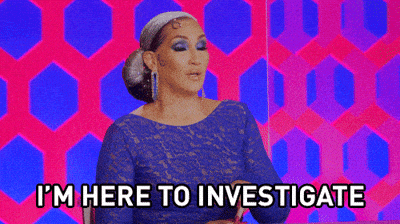- Wicked Club
- Posts
- 🤔 Signs You’re Better Off Without Credit Cards
🤔 Signs You’re Better Off Without Credit Cards
Explained Inside: How to Dispute Errors on Your Credit Report

Hey Wicked Club fam,
Happy Tihar and Diwali to everyone celebrating! This season is all about the power of light over darkness and wisdom over ignorance—reminding us why we're all here together as a community. Just as we light up our spaces for Tihar and Diwali, we’re also working to light up our financial journeys, step by step. It’s inspiring to see us all here, committed to growing in knowledge and making smarter choices for our future.
Okay, now let’s jump into the topics of the week, shall we?
🗒️ This week’s rundown:
🤔 Credit Cards: Friends or Frenemies? Signs You’re Better Off Without

Okay, I’ve got to break it to you: While I love encouraging young people to get credit cards to maximize rewards and build credit—since it's one of the easiest ways to start your credit journey—not everyone is suited for them. Yes, they’re powerful tools, and if you use them right, they can lay down the foundation for your financial future. But for some, they can lead straight to financial stress if mishandled.
So many times, people come to me with stories of maxed-out balances, missed payments, or tanking credit scores, asking, “What do I do now?” The hard truth? Sometimes, the best advice is to stop relying on credit cards, pay off those balances, and step away from the swipe for a while.
If you’re not a pro at tracking your spending, keeping up with payments, or knowing exactly what you’re signing up for, credit cards may not be your BFFs. 🤷♀️
Let’s dive into when credit cards might be more of a frenemy than a friend:
1. You Tend to Carry a Balance Month to Month
One of the biggest perks of credit cards—rewards and cash back—can easily be negated by high interest rates if you’re carrying a balance. Credit cards are a great option for those who can pay their balances in full each month, avoiding interest charges altogether. However, if you often find yourself paying only the minimum, interest can quickly compound, making purchases cost significantly more over time. This makes the card more of a financial drain than a friend.
Solution: Only charge what you can comfortably pay off each month, and prioritize paying down your balance if you already carry debt.
2. You Often Miss Payment Deadlines
Missing even one payment can hurt your credit score and lead to penalty interest rates, higher late fees, and damaged credit. A consistent pattern of late payments can stay on your credit report for up to seven years, impacting your ability to get loans, qualify for a mortgage, or even get favorable interest rates in the future.
Solution: Set up automatic payments, or use a budgeting app with reminders to keep track of payment dates. Even paying the minimum balance on time is better than missing a payment entirely.
3. You See Your Credit Limit as Free Money
While your credit limit may be tempting, it isn’t a green light to spend. Treating your credit limit as extra cash often leads to overspending and makes it harder to pay off the balance. It also increases your credit utilization ratio (the amount of available credit you use), which can negatively impact your credit score.
Solution: Set a personal spending limit that’s lower than your actual credit limit. Aim to keep your credit utilization below 30% for a better credit score.
4. You Don’t Track Your Spending
Credit cards make it easy to spend without immediately feeling the impact on your wallet. This ease of use can sometimes lead to “out of sight, out of mind” spending. Not tracking your expenses on credit cards may lead to higher-than-expected bills at the end of the month, making it easy to overspend and go over budget.
Solution: Make it a habit to check your balance weekly and categorize your spending. Using your credit card issuer’s app or a budget-tracking tool can help you stay aware of your spending patterns.
5. You’re Hooked on the Rewards, Even If It Means Overspending
Rewards programs are designed to make you want to spend, but chasing points or cash back without a real plan can do more harm than good. Spending extra just to hit a bonus target usually means paying more than you planned, especially if you carry a balance and end up paying interest on those purchases.
Solution: Only go for rewards that match your spending habits naturally. A card that rewards your typical purchases can benefit you more than one with fancy rewards you rarely use.
6. You Don’t Understand the Terms and Conditions
Credit card agreements are often long and filled with jargon, but they’re essential to understand. Terms like introductory APRs, balance transfer fees, and rewards structures can vary greatly between cards. Not understanding these terms can lead to unexpected fees and missed benefits.
Solution: Take the time to read through the terms when you open a new card. If something is unclear, call customer service or research online so that you know exactly what fees and interest rates apply.
If you relate to any of the habits above and need a different way to work on your credit, make sure to check out our previous newsletter where I talked about how to build credit without credit cards.
Credit cards can be fantastic financial friends if you’re careful and strategic about how you use them. But if any of these habits sound familiar, it might be time to rethink your relationship with credit cards. They’re not worth the stress of carrying debt or the hit to your credit score. Keep it simple, use credit wisely, and focus on building good habits, and you’ll be in great shape!
🥷 How to Dispute Errors on Your Credit Report

Did you know it can take up to seven years for certain negative items, like late payments or collections, to fall off your credit report? That’s a long time for one mistake to impact your credit score! But if there’s an error on your report — say, a debt listed more than once or a payment incorrectly marked as late — you don’t have to wait years to fix it. Addressing these mistakes quickly can improve your credit score and help you maintain a healthy financial profile.
Here’s a step-by-step guide on how to dispute credit report errors and keep your credit report accurate.
Step 1: Obtain Your Credit Report
First, obtain your credit report from each of the three major credit bureaus: Experian, Equifax, and TransUnion. You’re entitled to a free report from each bureau every 12 months through AnnualCreditReport.com, so take advantage of this to check for inconsistencies or errors across all three reports. In fact, they’re currently offering free weekly credit reports, so you can check even more frequently!
Step 2: Review Your Report for Errors
Carefully review each section of your report. Common errors to look for include:
Personal Information: Check for misspellings or incorrect addresses.
Account Information: Look out for accounts that aren’t yours, incorrect balances, or wrong credit limits.
Payment History: Watch for on-time payments marked as late.
Duplicate Accounts: Duplicate entries can inflate your debt-to-income ratio, harming your credit score.
Expired Debts: Accounts older than seven years should generally not appear on your report.
Mark any errors you find and gather any related documentation, such as bank statements, account confirmations, or payment receipts. These will support your claim in the dispute process.
Step 3: Contact the Credit Bureau
To dispute an error, you’ll need to contact the credit bureau that reported it. You can file disputes online, by phone, or by mail for each bureau:
Experian: Online through their dispute center or call their customer service.
Equifax: Use their online portal or mail a dispute letter.
TransUnion: Submit a dispute via their website or mail.
In your dispute, include your contact info, the account in question, and a clear explanation of why it’s incorrect. Attach any supporting documents.
Tip: Make copies of everything before sending it in, especially if you’re mailing your dispute. Keep your original documents. The Consumer Financial Protection Bureau (CFPB) also provides a helpful template letter to make the process easier.
Step 4: Contact the Information Provider
You should also reach out to the original creditor or company that reported the incorrect information. Explain the issue, provide any supporting documents, and request that they correct their records. If they find the error on their end, they’re required to update the credit bureaus as well.
Step 5: Wait for a Response
The credit bureau has 30 days to investigate your dispute (45 days if additional information is provided). They will contact the company that provided the information and notify you of the outcome. If the investigation finds an error, the bureau will update your report. If the dispute isn’t resolved in your favor, you can ask the bureau to add a note in your file explaining the dispute.
Step 6: Submit a Complaint if Needed
If you’re unsatisfied with the results, you can file a complaint with the CFPB, which can help mediate your dispute with the credit bureau or creditor.
💸 Attention, Fellow New Yorkers and Renters! 💸
As a New Yorker who rents myself, I’ve got to share one of my favorite finds: the Bilt Mastercard. I’ve been using it for over a year now, and let me tell you — it’s a game-changer! Not only do I get to pay rent without any fees, but I’ve also racked up a ton of points. Every renter should have this card; it’s just perfect.
With Bilt, you can finally earn rewards on rent payments, and the points can go toward travel, dining, and even saving on next month’s rent! If you’re paying rent each month, why not make it work for you? 👉 Use my referral link and start stacking up those points! 🏙️💳
Note: Some links in this article may be referral links. This means I may earn a small commission if you decide to use them. Your support helps me keep providing valuable content, and I truly appreciate it!
🚀 Action Items for Wicked Club Fam
🔍 Got questions? We've got answers! Don't hesitate to reach out if you have anything on your mind about the app.
⬇️ Want to optimize your credit card rewards? Download our app to start maximizing your rewards today!
🚀 Been a tester of our Wicked Pay app? We value your early insights. Share your thoughts through our survey form here.
📰 New to the crew? Subscribe to our newsletter for all the latest updates, and spread the word to your friends!
💬 Connect with fellow credit card enthusiasts? Join our Discord server for the beta testers and other credit card enthusiasts here.
✨Want to see behind the scenes of how we’re building Wicked Pay? Follow our CEO Pooja on Instagram at @poojabuilds.
Alright, fabulous fam, that’s a wrap for this week! 🎉 I want to give a huge shoutout to all of you for sticking around! But I have a tiny favor to ask: can you hit reply and let me know how I’m doing? Are we vibing? Is the content helpful, or do you think I need to spice things up a bit?
I’m all ears for your suggestions, or if you want to keep it super simple, just send me a thumbs-up or down emoji to share your feelings. No hard feelings, I promise! Your feedback means the world to me, so let’s keep this convo going! 💬✨
Thanks again and I’ll see you on the next one! Stay safe and take care!
Love,